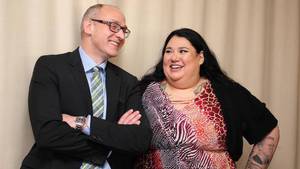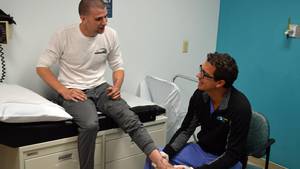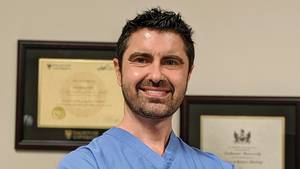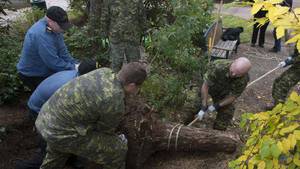Dr. Emily Krauss has only been working at the QEII Health Sciences Centre since the beginning of 2022, but she’s already changing lives by offering specialized hand and peripheral nerve surgery for the first time in Atlantic Canada.
Performed by only a specialized group of surgeons worldwide, the procedure helps individuals restore the use of their hands following cervical spinal cord injuries.
In collaboration with the QEII’s rehabilitation medicine team, Dr. Krauss recently started a multi-disciplinary clinic that treats patients who have lost limb functions. The department’s keen interest in collaboration is one of the main reasons Dr. Krauss, who completed her surgical residency at Dalhousie University, decided to move back to Halifax.
“If you work on a collaborative team, you have the opportunity to do these clinics that have a significant impact on the care you can provide,” says Dr. Krauss, who had two different multi-disciplinary clinics in Victoria, B.C., before coming to Halifax.
As part of her work with the QEII, Dr. Krauss collaborates with two other plastic surgeons — one in Newfoundland and one in New Brunswick — who also have specialized training in nerve injuries, as well as research backgrounds.
“We’ve set up this group and a patient database to help us look at their experience of injury, the severity of the injury and health outcomes after surgery,” says Dr. Krauss. “Our goals are to look at what barriers keep patients from accessing peripheral nerve surgeons and how to overcome these barriers to help these patients to go on to have successful surgeries, which is very exciting.”
Dr. Krauss has assessed around 15 spinal cord injured patients and performed eight hand surgeries at the clinic to date. She estimates that more than 75 per cent of patients who receive surgery will get meaningful function back in their hands, although results may take time to see.
“We’re only eight or nine months into starting the program, so we’re going to know more a year from now and a lot more two years from now,” she says.
The program has been a team-focused approach involving several essential players, including the surgeons, spinal cord injury rehabilitation medicine physicians, researchers, physiotherapists and occupational therapists.
Robert Patey recently received surgery on both hands and says he was thrilled by the small improvements to the stiffness he was experiencing in his fingers. The 59-year-old suffered an acute incomplete spinal cord injury after experiencing a fall at home in 2021, causing him to lose major function in his upper and lower body.
He spent about eight months at the Nova Scotia Rehabilitation and Arthritis Centre at the QEII and says that having increased mobility in his hands and fingers was a high priority.
“That’s why I was excited to learn I was eligible for the surgery. It’s phenomenal,” he says.
Having the ability to perform simple tasks like cutting his food, buttering his bread or taking apart his wheelchair would be a huge game-changer for Robert who, as a member of the military, is temporarily staying in specially equipped living quarters at CFB Shearwater.
Dr. Jason Williams, division head and QEII plastic surgeon, is thrilled to have Dr. Krauss onboard as a hand and nerve expert.
“We’re delighted with what she’s accomplished so far and are excited about the future,” he says. “Her training and her expertise in peripheral nerve surgery are unique in Nova Scotia. She’s the only Nova Scotia surgeon offering this level of surgery.”
Dr. Sonja McVeigh echoes Dr. Williams’ excitement. As a Physical Medicine and Rehabilitation (PM&R) spinal cord injury medicine specialist at the QEII working to improve limb function whenever possible, she says it’s a major win for patients to have Dr. Krauss on the team.
In fact, it’s a specialization of surgery that she’s been trying to bring to the QEII from a rehabilitation perspective for years.
“Now we’re building this program to improve upper extremity function where we do a collaborative clinic once a month, and we see both new spinal cord patients as well as previous patients who’ve had spinal cord injuries in years past.”
Due to the work of Dr. Krauss and her team, the QEII is helping patients throughout the province discover new health outcomes they might not have thought possible.








